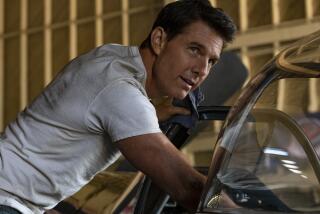Kozlowski Charged With Tax Evasion
- Share via
NEW YORK — L. Dennis Kozlowski, the mega-rich deal maker who built Tyco International Ltd. into a huge conglomerate, was charged Tuesday with evading more than $1million in taxes owed on purchases of artwork.
In a 12-count indictment in New York State Supreme Court, prosecutors alleged that Kozlowski engaged in an elaborate scheme with several art dealers to avoid paying New York state and city sales taxes on at least six paintings worth $13.2 million.
The paintings, including works by Claude Monet and Pierre Auguste Renoir, were purchased by Kozlowski over the last 10 months.
Under state law, people who buy goods in New York do not owe sales taxes as long as the items are shipped out of the state for use elsewhere. But Manhattan Dist. Atty. Robert Morgenthau alleged that Kozlowski sought to give the appearance that the paintings were destined for Tyco’s executive offices in New Hampshire when in reality they were hanging on the walls of his opulent Fifth Avenue apartment.
In one instance, Kozlowski had an art dealer ship five empty boxes to New Hampshire, Morgenthau alleged. Another time, a painting mounted in Kozlowski’s apartment was taken down and driven to New Hampshire. There, a Tyco employee signed for receipt of the painting, which was then immediately trucked back to New York, the prosecutor said.
“For somebody who is highly paid to fail to pay over $1 million in sales tax is a serious crime,” Morgenthau said at a news conference. “The city and state need the money and everybody has to pay their fair share.” The combined state and city sales tax rate is 8.25%.
What’s more, the money Kozlowski used to buy some of the paintings came from a fund Tyco set up to help employees exercise stock options, prosecutors said. It let workers borrow money at no interest. Kozlowski appears to have repaid some of the money, prosecutors said.
As chief executive of Tyco, Kozlowski was awarded a pay package last year worth about $125 million.
Kozlowski, who resigned from Tyco on Monday, pleaded not guilty to charges of sales tax violations, falsifying business records, tampering with physical evidence and conspiracy. Each charge is punishable by up to four years in prison, except for the conspiracy charge, which carries a maximum one-year term.
Kozlowski, 55, was released on a $3-million bond. Judge Arlene Goldberg ordered him not to travel outside the country without court permission and to surrender his passport to his attorney. His next hearing is June 26.
Kozlowski’s lawyer, Stephen Kaufman, disputed the charges in court, deriding them as “lacking in substance.” Kaufman declined further comment outside the courtroom, as did Kozlowski.
The indictment of Kozlowski probably marks the denouement of one of the most highflying, and controversial, careers in corporate America in the last decade.
It also deals perhaps the most serious blow yet to the soiled image of American CEOs.
In the late 1990s, many CEOs, including Kozlowski, were lionized as the personification of “new-economy” opportunity and success.
But a flurry of financial scandals since late last year, including the collapses of Enron Corp., Global Crossing Ltd. and Adelphia Communications Corp., have been accompanied by charges of massive accounting chicanery and executive self-dealing. The scandals have left many CEOs looking like avatars of bull-market greed.
“People talk about athletes and sports stars, and do they have a social duty to conduct themselves as role models for those who look up to them,” said Dov Seidman, who runs a Los Angeles consulting firm that gives legal and ethical training to employees of major corporations. “The same question is appropriately asked of CEOs, and perhaps more so.”
Kozlowski’s indictment recalls the saga of New York hotel magnate Leona Helmsley, who was at the center of a high-profile tax brawl in the 1980s.
Helmsley was convicted on 33 counts of tax evasion for claiming $1.2 million in personal expenses incurred between 1983 and 1985 as business deductions. Kozlowski’s attorney, Kaufman, also represented Helmsley.
Morgenthau said his investigation began with a tip from the state’s banking department. It also was spurred by his concerns about U.S. companies that designate offshore locales as their official corporate headquarters, he said.
Such headquarters shifts, which usually are made to minimize U.S. taxes, often raise a red flag about a company, Morgenthau said. Kozlowski relocated Tyco’s nominal headquarters to Bermuda in 1997.
It was unclear what role, if any, other Tyco workers may have played in the Kozlowski episode.
Tyco employees were ordered to sign false documents claiming to have received artwork in New Hampshire, Morgenthau said. But he said he didn’t know if any Tyco employees were involved in the alleged sales tax scheme. “The investigation is continuing,” he said.
Tyco spokesman J. Brad McGee said the company is cooperating with Morgenthau’s office, adding that “we have not been informed of any employee being part of the investigation.”
Besides Kozlowski, the indictment charges four unnamed art dealers and consultants with taking part in the fraud.
Since the late 1990s, Kozlowski has been lauded as the architect of a fast-growing leader of the new economy, as Tyco’s sales rocketed from $13 billion in 1997 to $36 billion last year, thanks to hundreds of acquisitions. The company’s products include electronic parts, telecom systems, medical equipment and burglar alarms.
But along the way Tyco was dogged by allegations that it used accounting tricks to plump its earnings.
Tyco’s stock soared from $13 in 1996 to a peak of $62 in 2001. But the price has collapsed this year amid mounting worries over Tyco’s debt load from its acquisitions.
The shares, which dived $5.90 to $16.05 on the New York Stock Exchange on Monday, inched up 72 cents to $16.77 on Tuesday.
More to Read
Sign up for Essential California
The most important California stories and recommendations in your inbox every morning.
You may occasionally receive promotional content from the Los Angeles Times.













